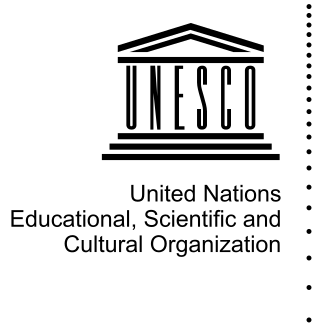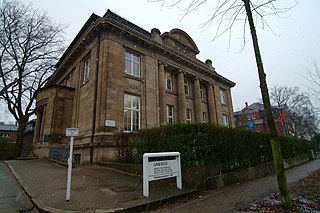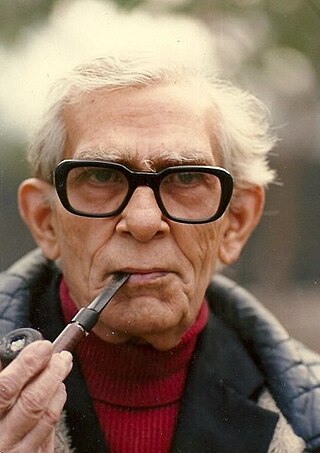
Adult education, distinct from child education, is a practice in which adults engage in systematic and sustained self-educating activities in order to gain new forms of knowledge, skills, attitudes, or values. It can mean any form of learning adults engage in beyond traditional schooling, encompassing basic literacy to personal fulfillment as a lifelong learner, and to ensure the fulfillment of an individual.
Lifelong learning is the "ongoing, voluntary, and self-motivated" pursuit of learning for either personal or professional reasons.
The history of education in Africa can be roughly divided into pre- and post- colonial periods. Since the introduction of formal education to Africa by European colonists, African education, particularly in West and Central Africa, is characterised by both traditional African teachings and European-style schooling systems. The state of education reflects not only the effects of colonialism, but instability resulting from and exacerbated by armed conflicts in many regions of Africa as well as fallout from humanitarian crises such as famine, lack of drinking water, and outbreaks of diseases such as malaria and Ebola, among others. Although the quality of education and the quantity of well-equipped schools and teachers has steadily increased since the onset of the colonial period, there are still numerous inequalities evident in the existing educational systems based on region, economic status, and gender.
Technological literacy is the ability to use, manage, understand, and assess technology. Technological literacy is related to digital literacy in that when an individual is proficient in using computers and other digital devices to access the Internet, digital literacy gives them the ability to use the Internet to discover, review, evaluate, create, and use information via various digital platforms, such as web browsers, databases, online journals, magazines, newspapers, blogs, and social media sites.
International Literacy Day is an international observance, celebrated each year on 8 September, that was declared by UNESCO on 26 October 1966 at the 14th session of UNESCO's General Conference. It was celebrated for the first time in 1967. Its aim is to highlight the importance of literacy to individuals, communities and societies. Celebrations take place in several countries.

The International Programme for the Development of Communication is a United Nations Educational, Scientific and Cultural Organization (UNESCO) programme aimed at strengthening the development of mass media in developing countries.

Non-formal learning includes various structured learning situations which do not either have the level of curriculum, syllabus, accreditation and certification associated with 'formal learning', but have more structure than that associated with 'informal learning', which typically take place naturally and spontaneously as part of other activities. These form the three styles of learning recognised and supported by the OECD.

The UNESCO Institute for Lifelong Learning (UIL), formerly UNESCO Institute for Education, is one of six educational institutes of UNESCO. It is a non-profit international research, training, information, documentation and publishing centre on literacy, non-formal education, adult and lifelong learning. It provides services to UNESCO's Member States, NGOs, and grassroots and community organizations, as well as to partners in civil society and the private sector. The Institute works in close collaboration with its Paris headquarters, with UNESCO field offices in different countries, with sister institutes and with national and international partners.
The UNESCO Institute for Statistics (UIS) is the statistical office of UNESCO and is the UN depository for cross-nationally comparable statistics on education, science and technology, culture, and communication.
The development of the European Lifelong Learning Indicators (ELLI) is an initiative of the non-profit Bertelsmann Stiftung to monitor the state of lifelong learning in Europe. The main focus of the ELLI project is the ELLI Index. The ELLI index is an annually updated composite indicator summarizing the state of lifelong learning for European countries. The ELLI IT platform is an online portal that provides access to regional data related to learning and socio-economic outcomes in Europe.

Mushtaq Ahmed Azmi, was a mass literacy expert. He was one of the first non-officials to be associated with the development of Adult Education program in India from the early 1950s, and was an early leader of the mass literacy movement. As an officer of UNESCO, he was posted in Africa and seconded to lead mass literacy programs in Nigeria and Zambia. He was offered a position in the UNESCO by the British diplomat and head of fundamental education at UNESCO John Bowers.
Open educational resources (OER) are learning materials that reside in the public domain or have been released under an intellectual property license that permits their free use and re-purposing by others. OER policies are adopted by governments, institutions or organisations in support of the creation and use of open content, specifically open educational resources (OER), and related open educational practices.
Global citizenship education (GCED) is a form of civic learning that involves students' active participation in projects that address global issues of a social, political, economic, or environmental nature. The two main elements of GCE are 'global consciousness'; the moral or ethical aspect of global issues, and 'global competencies', or skills meant to enable learners to participate in changing and developing the world. The promotion of GCE was a response by governments and NGOs to the emergence of supranational institution, regional economic blocs, and the development of information and communications technologies. These have all resulted in the emergence of a more globally oriented and collaborative approach to education. GCE addresses themes such as peace and human rights, intercultural understanding, citizenship education, respect for diversity and tolerance, and inclusiveness.
Daniel A. Wagner is the UNESCO Chair in Learning and Literacy, and professor of education at the University of Pennsylvania, where his research specializes in learning, literacy, child development, educational technologies, and international educational development. He is founding director (1983) of Penn’s Literacy Research Center and the federally funded National Center on Adult Literacy (1990). In recent years, the center has become the International Literacy Institute (ILI), co-established by UNESCO and the University of Pennsylvania. Wagner is also the director of Penn’s International Educational Development Program (IEDP) and is a Fellow of the American Psychological Association, the American Anthropological Association, and the American Educational Research Association. He is the author numerous books and articles on learning, literacy, cross-cultural research and methodologies, and is a frequent speaker at major national and international conferences across the world. He has worked as an advisor to, among others, the World Bank, UNESCO, UNICEF, USAID, and DFID. In 2012, Wagner was appointed by Hillary Clinton as a Member of the U.S. National Commission for UNESCO. In the same year, he was named UNESCO Chair in Learning and Literacy. In 2012-2014, he served as Chair of the Brookings Global Research Task Force on Learning. In 2014, he was a recipient of the UNESCO Confucius International Literacy Prize. He has maintained multi-year educational projects in India, South Africa, and Morocco.
TVE refers to all forms and levels of education and which provide knowledge and skills related to occupations in various sectors of economic and social life through formal, non-formal and informal learning methods in both school-based and work-based learning contexts.To achieve its aims and purposes, TVE focuses on the learning and mastery of specialized techniques and the scientific principles underlying those techniques, as well as general knowledge, skills and values.
A qualifications framework is a formalized structure in which learning level descriptors and qualifications are used in order to understand learning outcomes. This allows for the ability to develop, assess and improve quality education in a number of contexts. Qualifications frameworks are typically found at the national, regional, and international level.

Climate change education (CCE) is education that aims to address and develop effective responses to climate change. It helps learners understand the causes and consequences of climate change, prepares them to live with the impacts of climate change and empowers learners to take appropriate actions to adopt more sustainable lifestyles. Climate change and climate change education are global challenges that can be anchored in the curriculum in order to provide local learning and widen up mindset shits on how climate change can be mitigated. In such as case CCE is more than climate change literacy but understanding ways of dealing with climate
Monitoring Education for Sustainable Development (ESD) refers to measuring progress in ESD learning compared to policy commitments, provision, institutional support, resources and others. Monitoring and evaluation (M&E) of Education for Sustainable Development is widely discussed in literature on ESD, including debates regarding methodology and strategies for interpreting the data.
Mejai Bola Mike Avoseh is a professor of adult and higher education at the University of South Dakota. His teaching and research interests are in the areas of adult education, comparative/international/multi-cultural education and indigenous pedagogy. He is a member of the board of the American Association for Adult and Continuing Education (AAACE) since 2016, and of the International Society for Comparative Adult Education (ISCAE) from 2020 to 2023, and the Director of the Commission for International Adult Education (CIAE) of AAACE.

Sustainable Development Goal 4 is about quality education and is among the 17 Sustainable Development Goals established by the United Nations in September 2015. The full title of SDG 4 is "Ensure inclusive and equitable quality education and promote lifelong learning opportunities for all".






